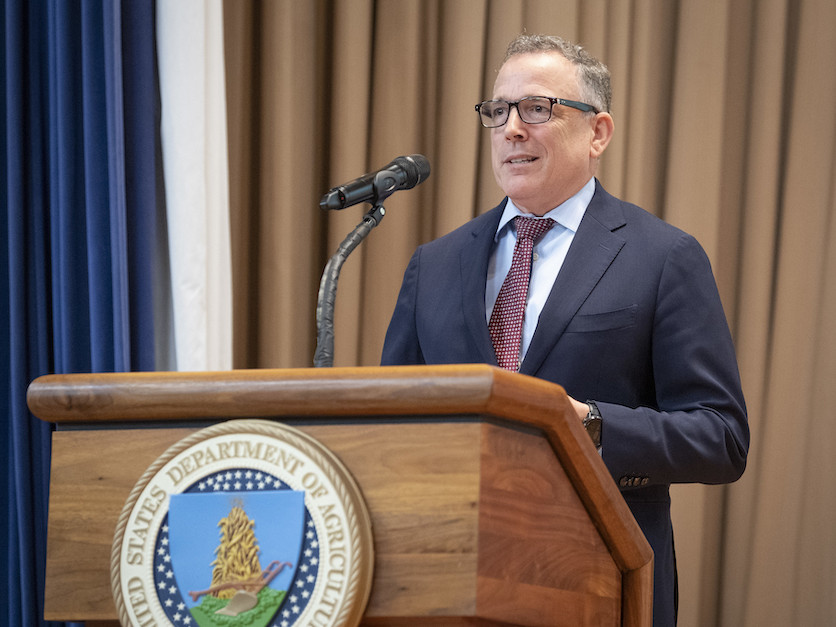Groups working to help farmers and consumers get legal rights to the information and parts they want to fix equipment are pushing the Federal Trade Commission for regulations on manufacturers’ repair policies.
The FTC is analyzing a petition submitted earlier this year by the U.S. Public Interest Research Group (PIRG) Education Fund and iFixit seeking “a rule protecting the right to repair,” while also considering more than 1,800 comments on the matter submitted by parties on both sides of the fight.
The FTC could grant or deny the petition in whole or in part, according to a Federal Register notice. It could also “deem the petition insufficient to warrant commencement of a rulemaking proceeding.”
The petitioners argued the FTC should use its Section 5 authority — which allows the agency to “address unfair methods of competition in or affecting commerce, and unfair or deceptive acts or practices” — to write rules that ensure “consumable components” and easily broken parts are readily available to consumers; equipment continues to be usable and repairable after being discontinued by manufacturers; parts from identical machines are interchangeable, and independent repair shops are not required to provide information on customers to the manufacturer.
These rules, they argued, could “prohibit particular repair-restrictive acts (such as destructive disassembly), require particular repair-supportive acts (such as making spare parts available), or require manufacturers to disclose information about repair or their products’ repairability.”
They also proposed the creation of a national system providing repairability scores on product labels, as well as new regulations barring manufacturers from requiring independent repair shops to purchase parts from “preapproved exclusive vendors” and prohibiting them from “parts pairing,” or using a “software barrier to prevent consumers or independent repairers from replacing parts without manufacturer approval.”
Enforcement bodies like the FTC have so far “struggled to keep up with” the growth of technological advances and evolving markets stemming from this growth, the petitioners argued. “Antitrust doctrine as applied in the federal courts,” they claimed, has “proven insufficient to address the scope of the problem.”
“A rule passed under Section 5 would empower the commission to better respond to ever-changing market conditions, that may or may not line up exactly with current antitrust precedents,” the petitioners said.
Associated Equipment Distributors Senior Vice President of Government and External Affairs Daniel Fisher, in a comment opposing the petition, called any FTC rulemaking on the matter “improper” since “Congress hasn’t determined whether policymaking in this area is warranted, or if it is, what the proper solution should be.” He also said the arguments made by PIRG and iFixit in the petition “relied on anecdotal rather than factual evidence to assert that manufacturers are engaging in ‘unfair and deceptive’ trade practices.”
 Daniel Fisher, Associated Equipment Distributors
Daniel Fisher, Associated Equipment Distributors“There’s a lot of back-and-forth on this issue and until there’s a consensus, especially among those who are actually writing the laws about how we would proceed, I would think that we should be extra cautious in terms of proceeding with a government solution, especially when our elected lawmakers haven’t really been able to come up with an agreement,” Fisher told Agri-Pulse.
Fisher, in the formal comment, also expressed concern about customers being allowed to bypass safety and emissions controls safeguards on the equipment.
“Equipment dealers invest countless resources to train certified technicians to work on complex machinery," he wrote. "Inviting unqualified individuals to attempt to repair the most safety-sensitive functions on the world’s most advanced and sophisticated equipment poses significant risk to themselves, operators, and the public."
Farmer groups that have long pushed for more federal restrictions on manufacturers’ repair policies, like the National Farmers Union and Farm Action, supported the idea of a new rulemaking in their comments. NFU president Rob Larew argued that farmers face “service delays and reduced options for repair due to the restrictions imposed by manufacturers.”
It’s easy to be “in the know” about what’s happening in Washington, D.C. Sign up for a FREE month of Agri-Pulse news! Simply click here.
NFU and six of its state affiliates in 2022 filed a complaint with the FTC alleging that John Deere’s repair policies violate antitrust laws and urging the regulator to use its Section 5 authorities “to address John Deere withholding from its customers diagnostic software and other information necessary to repair the Deere equipment they own.”
“While NFU continues to believe the FTC should pursue enforcement action as we previously requested and as noted above, and while we will continue to fight to pass legislation to ensure family farmers and ranchers have the right to repair their own equipment, NFU also supports FTC pursuing a rulemaking under the Commission’s Section 5 authority,” Larew wrote.
NFU also sent a letter to the Environmental Protection Agency last August asking the agency to weigh in on whether manufacturers should deny access to internal software systems over concerns about customers tampering with vehicles’ emissions control systems, Larew said in his comment. EPA Administrator Michael Regan, in response, said the Clean Air Act and EPA regulations “are aligned in preventing tampering not by limiting access to independent repair, but rather by enforcing the prohibition against tampering against any party that does so.”
 Rob Larew, National Farmers Union
Rob Larew, National Farmers UnionCommenters also debated whether federal intervention would be the right approach to the issue, or if it should be resolved within the private sector. So far, equipment manufacturers have sought to deal with farmer concerns through Memorandums of Understanding with the American Farm Bureau Federation, though the petitioners argued these agreements contained “no mechanism of enforcement and no recourse for farmers who do not feel well served by the MOU.”
The AFBF signed its first agreement with Deere last January, charging the farm equipment giant with making tools, software and documentation available “on fair and reasonable terms” to producers, while also ordering equipment owners not to modify protective measures, illegally infringe on copyrighted software and ensure the equipment complies with federal and state emissions control requirements. In return, the Farm Bureau promised to refrain from supporting federal or state legislation on the issue that goes beyond the language in the agreement.
Most of the commitments Deere made in the agreement were already in place at the company. Deere’s Customer Service ADVISOR, which provides access to manuals and connects to machines with an Electronic Data Link, was made available for purchase online in March 2022. At that time, the company promised to roll out an “enhanced customer solution” in 2023 that would allow producers to download software updates to embedded controllers on certain pieces of equipment. This was released in December through the company's Equipment Mobile app.
The two entities did agree to semi-annual meetings on the MOU and other "right to repair" issues through the agreement. Both organizations also had the right to withdraw from the MOU with 15 days' written notice.
AFBF has since followed with similar agreements with CNH Industrial, the manufacturer of Case IH and New Holland farm equipment, and AGCO, Kubota, and CLAAS. These agreements, AFBF senior counsel Andrew Freidman said in a comment, cover “approximately 75 percent of the agricultural machinery sold in the U.S."
Friedman defended the use of the MOUs. He said both the FTC and iFixit “have encouraged manufacturers and private sector groups to pursue industry and manufacturer-specific MOUs.”
“When AFBF’s members charged the organization with outreach to equipment manufacturers on the right to repair, they expressed a preference for private sector, market-based solutions over legislation,” Friedman wrote. “AFBF’s members believe it is about sitting down at the table and sorting things out, which is what was done and what will continue to occur under the MOUs.”
AED’s Fisher also defended the MOUs, which he said “should be given every opportunity to succeed before government intervention.”
Kevin O’Reilly, who previously served as PIRG’s right to repair campaign director and currently is a board member for Repair.org, argued in a comment that the MOUs “fall short of giving farmers full access to the software[,] tools and information required to comprehensively repair their equipment.” He pointed to differences between the customer and dealer versions of John Deere’s Service ADVISOR as an example.
“Customer Service ADVISOR, as is promised to farmers by the company's MOU, obfuscates information and withholds access to functions required to digitally authorize repairs,” O’Reilly wrote. “The same information and functionality is readily available in the dealer version of Service ADVISOR.”
For more news, go to Agri-Pulse.com.


